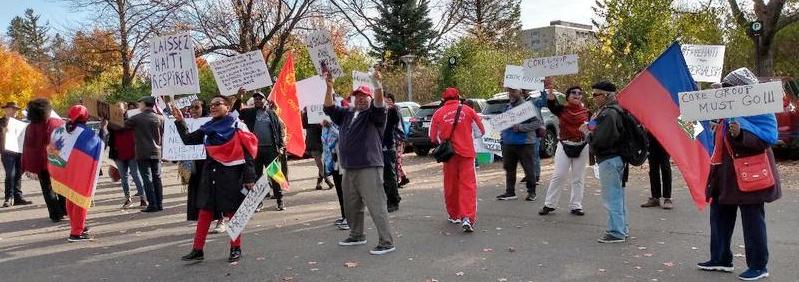October 27, 2022 - No. 36
No to Foreign Military Intervention in Haiti
The Dignity of the
Haitian People
Cannot Be Trampled

• Haiti Hand in
Hand with Mother Africa
• Security Council Vote on Invasion of Haiti Delayed
• Canadian and
U.S. "Assistance" in Haiti, Another Invasion
Under the Guise of Assistance
Our Security Lies in the Fight for the Rights of All
• Safe Third
Country Agreement Being Challenged
at the Supreme Court
Interview
• How the Safe Third Country Agreement Undermines Rights of Refugees in the U.S. and Canada
No to Foreign Military Intervention in Haiti
The Dignity of the Haitian
People
Cannot Be Trampled

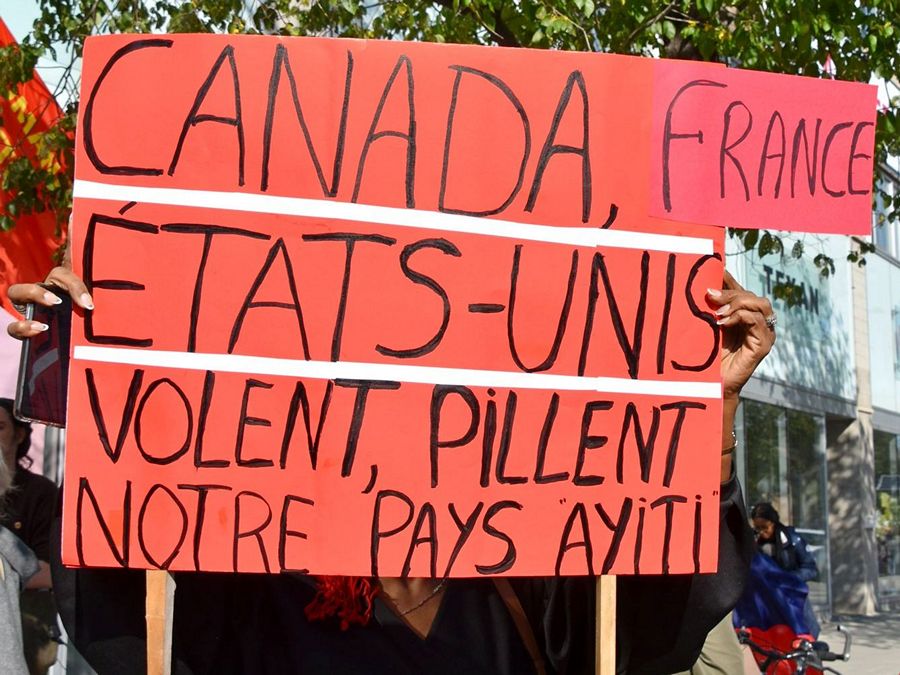 No
to Foreign Military Intervention in Haiti!, No to the Core
Group!, Freedom, Freedom, Freedom for Haitians! chanted
an organizer of the march on October 22 in Montreal. Gathered in
front of the office of Mélanie Joly, Canada's Minister of
Foreign Affairs, the demonstrators denounced the plan hatched by
foreign countries, including Canada and the U.S., to invade
Haiti under the pretext of bringing aid.
No
to Foreign Military Intervention in Haiti!, No to the Core
Group!, Freedom, Freedom, Freedom for Haitians! chanted
an organizer of the march on October 22 in Montreal. Gathered in
front of the office of Mélanie Joly, Canada's Minister of
Foreign Affairs, the demonstrators denounced the plan hatched by
foreign countries, including Canada and the U.S., to invade
Haiti under the pretext of bringing aid.
One after another in quick succession, for close to an hour, speakers recalled their bitter experience with the presence of foreign military forces in their country. The crimes committed by them under the dictate of the U.S., Canada, France and the UN against the Haitian people under military occupation are fresh in their memory: the rape of women, young girls and children, human trafficking, MINUSTAH which introduced cholera which has returned today, the looting of houses and so many other crimes.
The speakers denounced the fraudulence of the claims promoted by the Trudeau government that they stand for human rights, which Haitians who have come to live in Quebec and Canada have come to know. The fraud is seen in the fact that Canada denies these rights to the Haitian people in Haiti. Haitians are full human beings like Canadians, they said. They paid tribute to their ancestors and to national hero Dessalines who established a free Haiti where human beings are equal, ending slavery.
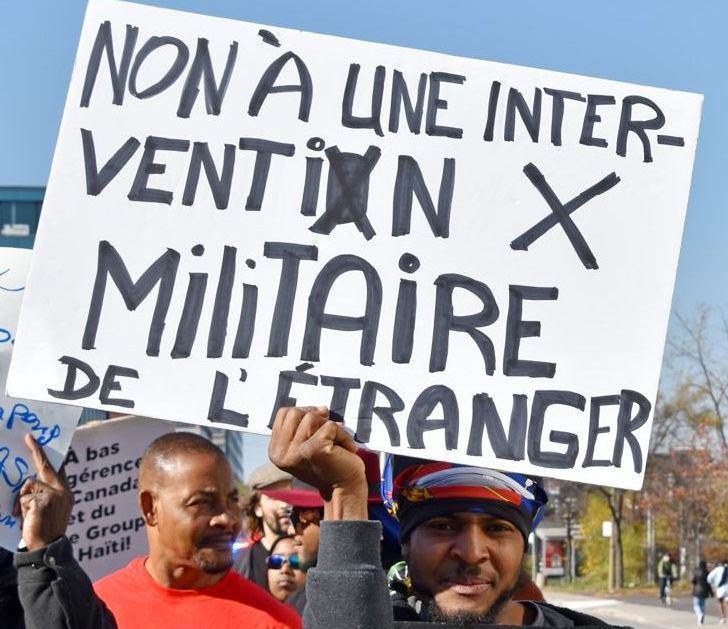 They also denounced corruption
and the financing of street gangs by wealthy Haitian families
and others who maintain chaos in the country. They reiterated
their demand for an end to all military intervention, with
or without the UN, and affirmed the inalienable right of the
Haitian people to defend their sovereignty and their right to
decide their destiny.
They also denounced corruption
and the financing of street gangs by wealthy Haitian families
and others who maintain chaos in the country. They reiterated
their demand for an end to all military intervention, with
or without the UN, and affirmed the inalienable right of the
Haitian people to defend their sovereignty and their right to
decide their destiny.
The demonstration continued for almost two hours, marching through the streets of Montreal chanting slogans in support of the just resistance struggle of the Haitian people: No to Corruption! No to the Core Group! No to any Foreign Intervention! No to Occupation! Enough Is Enough! and many others denouncing the dirty role of the Canadian government. They marched to Prime Minister Justin Trudeau's office where they reported that similar protests had taken place in the U.S., Martinique, Benin and Haiti. They then returned to Mélanie Joly's office where organizers announced they would continue their actions in the coming weeks.
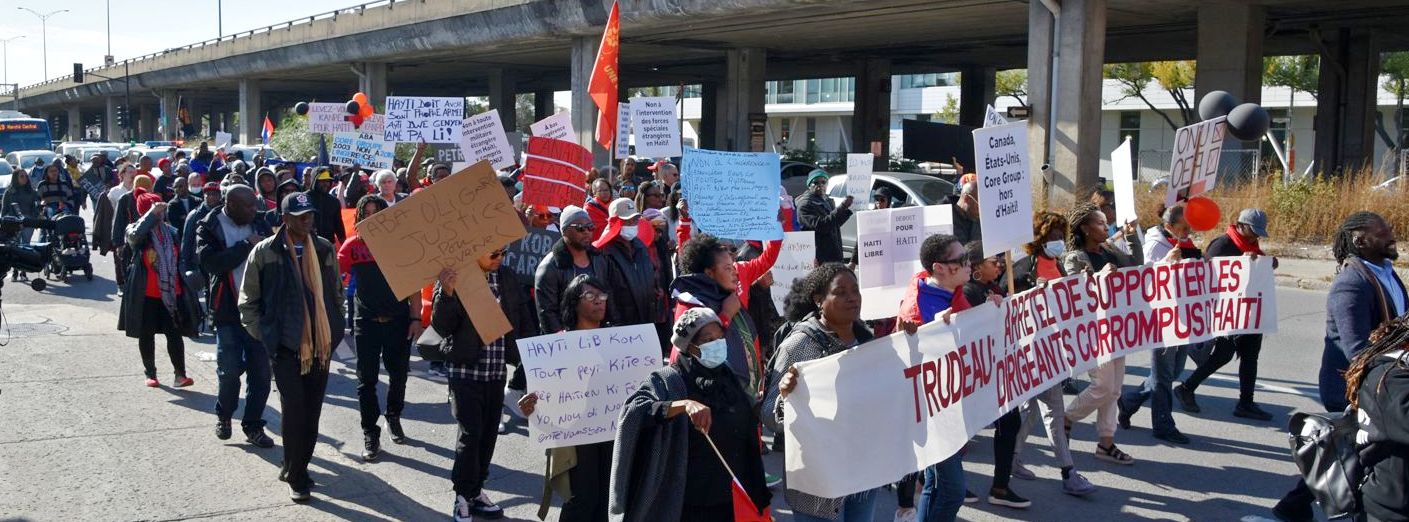
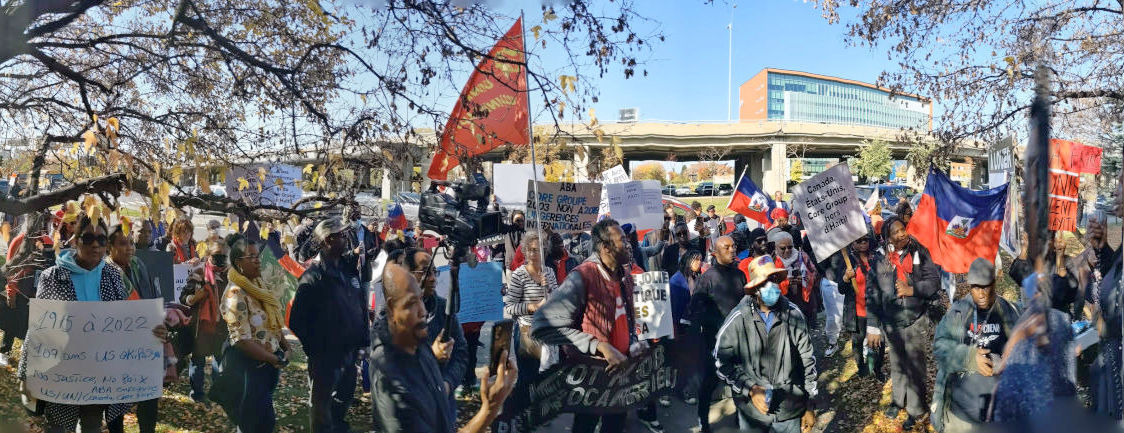
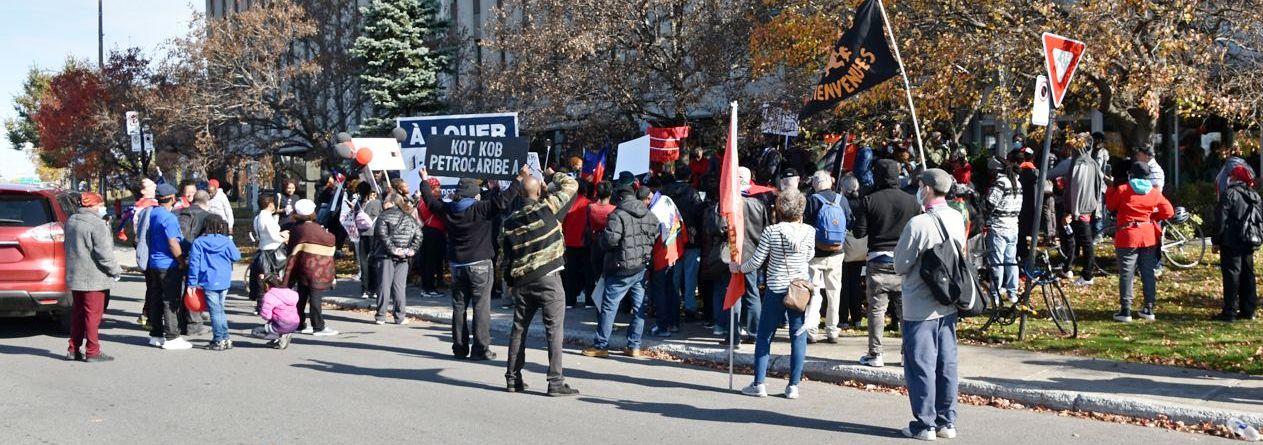
(Photos: TML)
Haiti Hand in Hand with Mother Africa
A demonstration was held in Ottawa on Friday afternoon,
October 21, in front of the French embassy in Canada where
distinctly anti-imperialist and anti-colonialist demands were
heard. The rally was called to support the struggles of the
peoples, particularly the peoples of Africa, against French
neo-colonialism and foreign interference in Haiti. The people
present chanted their opposition to the French presence in
Africa and demanded that French military forces leave their
countries, that the plundering of their natural resources and
the maintenance of mercenaries and terrorist groups cease.
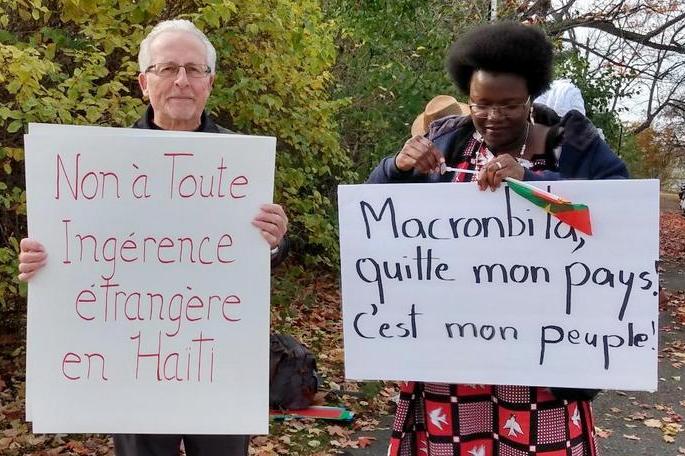 The sentiment expressed for
both Africa and Haiti was that it is the people who are
sovereign, that they must be the decision-makers, that they
must and will take control of their destiny.
The sentiment expressed for
both Africa and Haiti was that it is the people who are
sovereign, that they must be the decision-makers, that they
must and will take control of their destiny.
The demonstrators denounced recent developments in Haiti, where international forces, including Canada and the United States, are again interfering under the pretext that they have been invited by Ariel Henry and that the purpose is to fight the gangs in Haiti, when the primary purpose is to suppress the movement of the Haitian people who have been demonstrating en masse for several weeks against poverty, food insecurity, rampant inflation, fuel shortages, kidnappings and killings.
It was pointed out that if gangs and weapons exist in Haiti, it is thanks to the United States. There was an upsurge in the popular movement on October 10, following the government's call for foreign intervention, as the people demanded the resignation of the foreign imposed Prime Minister Ariel Henry and opposed any foreign intervention. Concrete proposals that are favourable to the people are being put forward, including the formation of a transitional government, to find solutions to the political crisis shaking the country.
A representative of CPC(M-L) spoke in front of the French embassy. He praised the struggles of the people of the world, in particular the courage and tenacity of the Haitian people in finding solutions to the crisis that is unfolding, starting with the departure of Ariel Henry and an end to all foreign interference in Haiti's affairs. He condemned the Canadian government's increased role in serving the United States, such as its role in the discredited Lima Group, formed to mobilize Latin American and Caribbean countries against Venezuela.
At the UN, Canada's Prime Minister was the first to speak out for further military intervention in Haiti in the name of "stability, security and prosperity," despite the fact that in 2004 the Canadian government played a leading role in the kidnapping of Jean-Bertrand Aristide, the duly elected president of the Haitian people, and the subsequent fraudulent elections when Aristide's Fanmi Lavalas party was banned.
After demonstrating in front of the French embassy for two hours, everyone made their way to Parliament Hill, passing by the U.S. embassy.
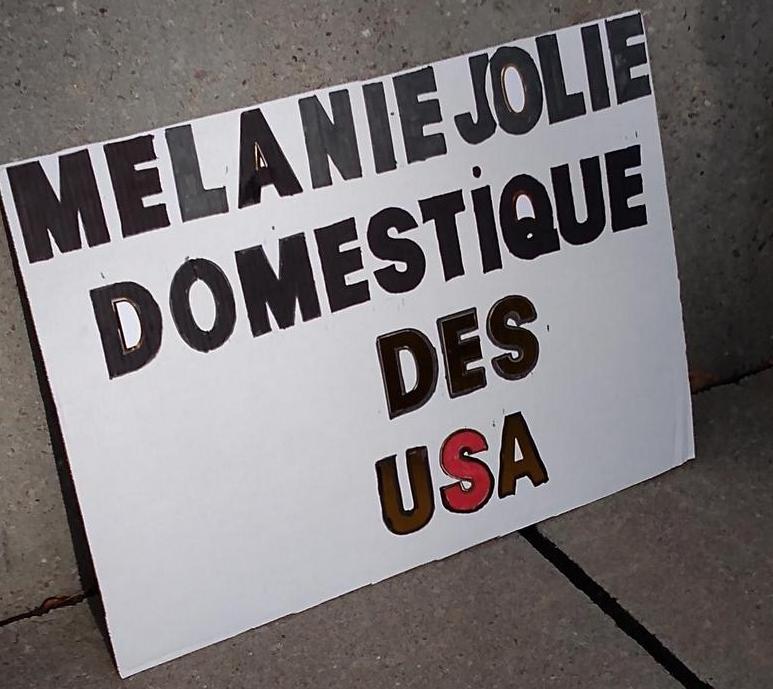
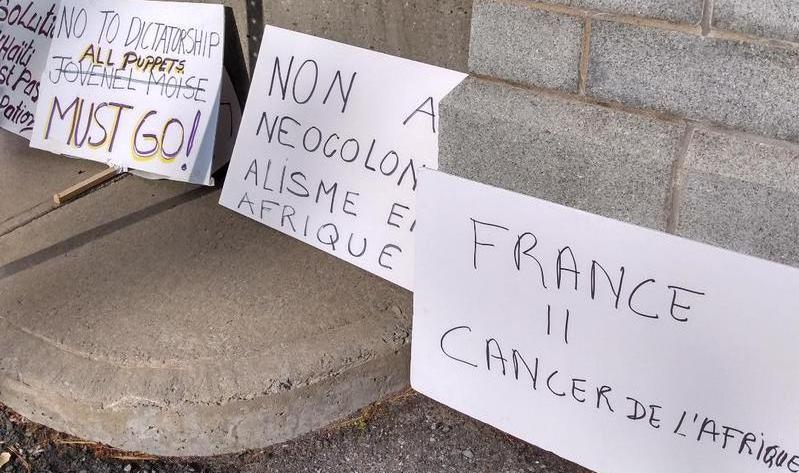
(Photos: Afrikayita)
Security Council Vote on Invasion of Haiti Delayed
On October 18, the Security Council of the United Nations delayed consideration of a vote to authorize intervention of foreign forces into Haiti.
Haiti-Americas team of the Black Alliance for Peace (BAP) stated: "We welcome the decision by Chinese and Russian representatives to the security council to speak up against the U.S.-Mexico push for another foreign military invasion of Haiti. We must also note, with worry, that the call for a "Non-UN" armed force, with no oversight, to invade Haiti is extremely reckless, and demonstrates the contempt with which the west and its minions hold the Haitian people. Haitian people do not want another U.S.-led foreign intervention; they want to assert their sovereignty and an end to imperialist meddling in their country."
The crisis in Haiti is the result of foreign exploitation and oppression, as well as intervention. First France milked Haiti dry, then the U.S. has repeatedly intervened so as to secure Haiti for itself. The U.S., the Core Group, which includes Canada, aligned with Mexico, the Dominican Republic and now members of CARICOM, claim their planned intervention is "humanitarian." The people of Haiti however make clear this is not the case. The invasion these forces are planning is not designed to serve the Haitian people and support their demands for sovereignty over their own affairs, but to bolster the illegitimate, criminal puppet government that they themselves have installed.
Canadian and U.S. "Assistance" in Haiti, Another Invasion Under the Guise of Assistance
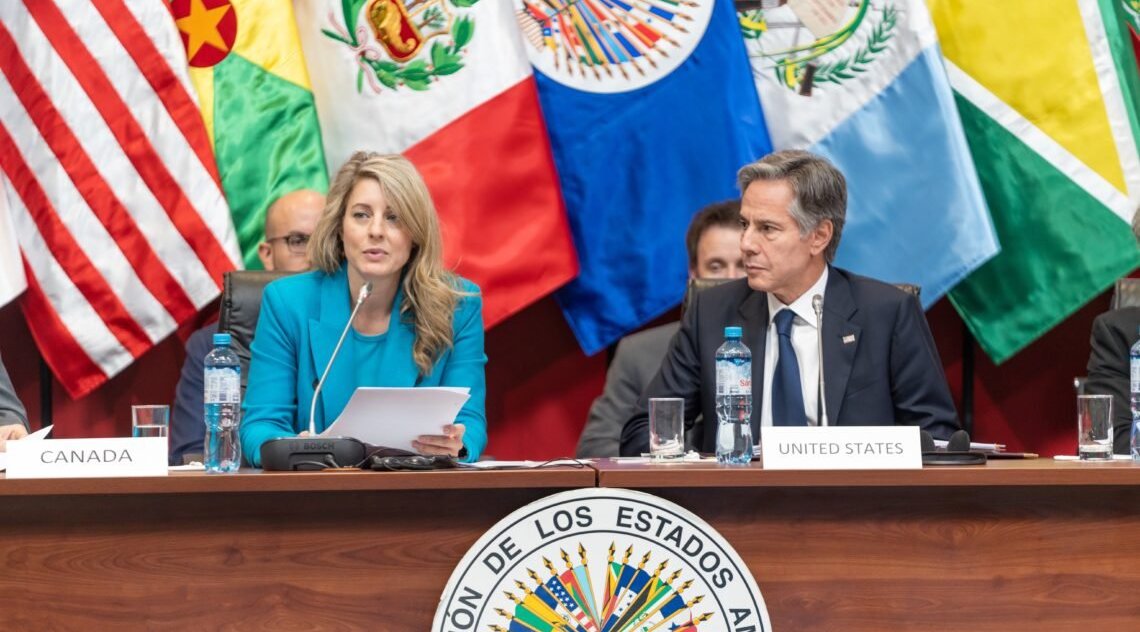 Canadian foreign minister Mélanie Joly leads
a meeting about Haiti, speaking beside U.S. Secretary
Canadian foreign minister Mélanie Joly leads
a meeting about Haiti, speaking beside U.S. Secretary
of State Anthony Blinken.
Canadian and U.S. military aircraft landed in Haiti to deliver military equipment to the Haitian national police, on October 15, 2022. These aircraft were preceded by the arrival of the U.S. national coast guard in Haitian waters three days earlier. How can such foreign military presence in Haiti be justified in terms of international law? Some have answered that question by pointing out that the Haitian government itself has asked for military intervention. But here's the problem: That request for a foreign military presence in Haiti is illegal, because article 236.1 of the Haitian constitution clearly forbids the presence of a foreign army on Haitian soil. The illegality of the request is all the more evident when one considers that there is no legitimate government in Haiti.
De facto Prime Minister Ariel Henry is a member of the PHTK party founded by former fraudulently elected president Michel Martelly. The PHTK has engaged in the looting of public funds, the dispossession of Haitian farmers and in State-sanctioned massacres according to an April 2021 report from the International Human Rights Clinic of the Harvard Law School. Henry was named by Jovenel Moïse, also a fraudulently elected president whose mandate had expired for months when he was assassinated on July 7, 2021. Former president Michel Martelly and Ariel Henry are both suspected of involvement in Moise's murder. Henry has been acting as Prime Minister of Haiti since July of 2021 and owes his designation to that function to the Core Group, a coalition of foreign ambassadors (with representatives of the U.S., Canada, France, Spain, Germany, Brazil, UN and OAS) that have been effectively running Haiti's affairs (from behind selected puppets) since the overthrow of democratically elected Jean Bertrand Aristide in 2004. Although Henry still enjoys the support of the Core Group, he was never approved as Prime Minister by the Haitian parliament as required by the Haitian constitution.
Ignoring constitutional and legal considerations, on October 9, UN secretary-general António Guterres responded to Ariel Henry's request for a military intervention by submitting to the Security Council a letter with options for enhanced security support to Haiti. A meeting of the UN Security Council took place on October 17 to discuss that letter and the question of Haiti. In anticipation of that Security Council meeting, the editorial board of the Washington Post decided to jump ahead and publish an opinion piece welcoming an upcoming international military intervention in Haiti. After implying that this force would help foster democracy in the country, the piece acknowledges that such a prospect is not to be taken lightly given the history of the MINUSTAH, the last UN-led intervention force. MINUSTAH started in 2004 and ended in 2017 after a series of extra judicial killings, sexual abuse scandals and the introduction of a cholera epidemic in the country.
What the Washington Post editorial board fails to mention is that, at the moment, there already is a UN presence in Haiti called the BINUH. That UN office in Haiti has been there since 2019 with the mandate to assist the Haitian government towards implementing democratic reforms. There has been criticism of the BINUH for its perceived support of the PHTK party and contested president Jovenel Moïse before his assassination. Prior to the failures of the MINUSTAH and the BINUH in Haiti, there have been at least eight previous international peacekeeping missions that have utterly failed to bring about democracy in Haiti. UN soldiers have been accused of raping, repressing and even killing innocent Haitian civilians.
This arrogant tendency to ignore the root causes of Haitian protests is reflected in the Globe and Mail's recent publication of an opinion piece calling for Haiti to be put under UN control, that can best be summarized as a prime example of what white saviour complex is all about.
In an interview with France 24, Haitian economist Camille Chalmers explained that foreign interventions have aggravated the societal crisis in Haiti by weakening state institutions and increasing the country's dependency on foreign entities. He described the calls for foreign intervention as an instrumentalization of the latest upheaval on the streets of Haiti. In Chalmers' view, these calls aim to legitimize autocratic and foreign powers in Haiti. What remains of the Haitian Senate have asked for Ariel Henry's request to be deferred. Several organizations including union members and ex-soldiers of the Haitian Army have described Ariel Henry's request as high treason. Activist groups in the Caribbean nation have denounced the request and have called for popular mobilization against the de facto government and against foreign interference. Protestors on the streets of several major Haitian cities carry "Down with the Core Group" signs. The BSA, members of the follow up committee of the Montana accord group that has been working on drafting Haitian solutions to the social, political and economic woes of the country have condemned Ariel Henry's request for foreign military intervention as unconstitutional.
Undeterred by Haitian opposition to the help they insist on offering, the Canadian Minister of Foreign Affairs, the Canadian Minister of National Defence, the U.S. Secretary of State and the U.S. Secretary of Defense have issued a joint statement on October 15 that provides the following explanation about their military presence in Haiti on that day:
"Canadian and U.S. military aircraft arrived in Port-au-Prince, Haiti to transfer vital Haitian government-purchased security equipment, including tactical and armored vehicles, and supplies to the Director General of the Haitian National Police (HNP). The delivery of the equipment was part of a joint operation involving Royal Canadian Air Force and U.S. Air Force aircraft."
"This equipment will assist the HNP in their fight against criminal actors who are fomenting violence and disrupting the flow of critically-needed humanitarian assistance, hindering efforts to halt the spread of cholera."
Following that joint statement, Canadian Prime Minister Justin Trudeau tweeted that the U.S. and Canada are committed to supporting the Haitian national police and both countries will "continue to support the restoration of security in Haiti." But what has been the result of U.S. and Canadian support so far? The U.S. has a very long and grim history of interfering in Haitian affairs. Most Haitians are well aware of the U.S. occupation that lasted from 1915 to 1934 which similarly to today's events followed the killing of a Haitian head of state, President Vilbrun Guillaume Sam. That 19 years-long U.S. occupation resulted in the theft of Haiti's entire national gold reserve by Citybank and the deaths of thousands of Haitians. It also ended democratic aspirations under the U.S.-backed regime. Although Canada's involvement in Haiti is much more recent than the U.S., in regards to the stated goals of restoring security or democracy, it has also proven to be disastrous.
From the Ottawa initiative on Haiti in 2003 up until now, Canadian foreign policy towards Haiti has been set to undermine the Black nation's sovereignty. There is an embrace of the racist view that Haitians are unable to govern themselves. The Canadian mainstream media tends to assimilate popular uprisings to gang violence. They have failed to report that most Haitian people have been protesting against the neo-liberal policies of the International Monetary Fund that have prompted the Haitian government to cancel fuel subsidies and raise gas prices. The Canadian government has built prisons in Haiti from which prisoners have repeatedly escaped. They've funded and trained the Haitian national police that has been accused of shooting peaceful protesters and of massacres in the poor neighbourhoods of La Saline and Bel-Air. Why does the Trudeau government want to continue down that path?
Very few Canadian journalists have investigated or reported on
the failures of Canadian involvement in Haiti. There is also a
resounding silence about the role of Canadian mining companies,
in the exploitation of Haiti's workers and pillaging of Haiti's
natural resources. Canadians who want to find out what is going
on in Haiti right now will be misled if their only sources of
information are U.S. and Canadian mainstream media. For the past
few days, the main talking points that pass for news about Haiti
have been about "gang violence" and about "calls for
international intervention to help Haiti". These talking points
are misleading because they obscure a certain number of
embarrassing facts about Canada's role in the ever-increased
violence Haitians have been enduring in the past decades. A
well-informed Canadian public would undoubtedly conclude that
foreign interventions are a problem, not a solution in Haiti and
all members of the Core Group, starting with Canada and the
United States, should get out of Haiti.
To view the above article on The Canada Files website click
here.
Jennie-Laure Sully is a member of
The Canada Files' Advisory Board. Sully is a community organiser
at La CLES, a support center for sexually exploited women and
girls. After studying anthropology and public health, Sully
obtained a master's degree in biomedical sciences from the
University of Montreal. Sully has also worked as a research
coordinator in hospitals and as a psychosocial caseworker in a
rape crisis center. She has written for The Monitor, Le journal
des Alternatives and Nouveaux Cahiers du Socialisme.
(October 18, 2022. Photo: U.S. Mission to the OAS)
Our Security Lies in the Fight for the Rights of All
Safe Third Country Agreement
Being Challenged
at the Supreme Court
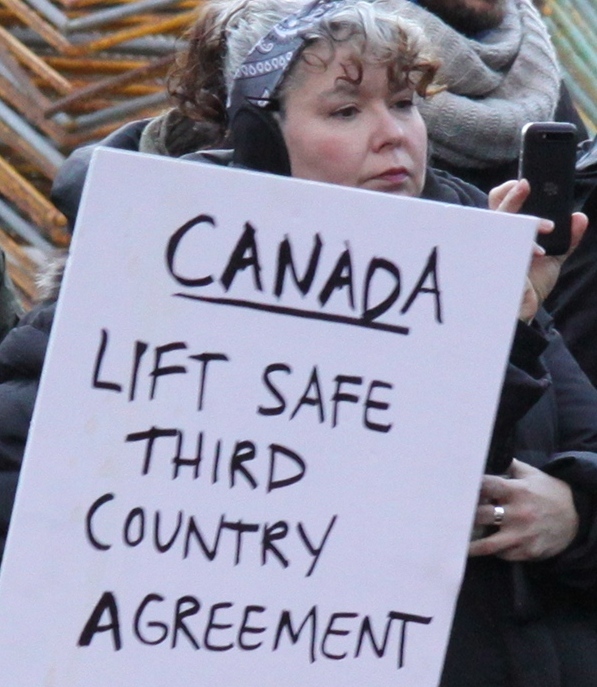
The STCA is being challenged by Amnesty International, The Canadian Council of Churches and The Canadian Council for Refugees. Although this will be the first time the Supreme Court of Canada hears a challenge to the STCA, it is not the first time a court challenge has been brought against the legislation. The two previous times, the Federal Court in Canada found that the STCA violated refugee claimants' Charter rights, yet twice the Federal Court of Appeal overturned these decisions on technical grounds. The STCA is causing many horrible consequences for those who seek refuge, and it should be ended.
A summary of the challenge provided by the court states:
"Since the 2004 agreement between Canada and the United States known as the Safe Third Country Agreement, the U.S. has been designated a safe country pursuant to s. 159.3 of the Immigration and Refugee Protection Regulations, S.O.R./2002 227. As a result, claimants arriving at a land port of entry to Canada from the U.S. are deemed to be ineligible for refugee protection in Canada pursuant to s. 101(1)(e) of the Immigration and Refugee Protection Act, S.C. 2001, c. 27. The individual applicants are among those claimants who were deemed ineligible. The applicants ABC and her children are from El Salvador, claiming refugee status based on gang violence and gender-based persecution. The Homsi/Al Nahass applicants are a Muslim family from Syria who left the U.S. following the issuance of the first travel ban by the U.S. government. The applicant Ms. Mustefa is a Muslim woman from Ethiopia who was detained after her attempt to enter Canada from the U.S. The applicant organizations were granted the right to participate as public interest parties. The collective applicants challenged the Canadian government's failure to review the ongoing designation of the U.S. under s. 159.3 of the Regulations as rendering that provision ultra vires and not in conformity with s. 101(1)(a), 102(2) ad 102(3) of the Act. They also claimed that the designation and their ineligibility to claim refugee status infringed their rights guaranteed under sections 7 and 15 of the Canadian Charter of Rights and Freedoms and were not justified under s. 1.
"The Federal Court rejected the ultra vires argument but held that s. 159.3 of the Regulations and s. 101(1)(e) of the Act infringed s. 7 of the Charter and were not justified under s. 1. The court found it unnecessary to consider whether the provisions also infringed s. 15. The appellate court allowed the appeal, dismissed a cross-appeal on the ultra vires and s. 15 issues, set aside the Federal Court decisions, and dismissed the applications for judicial review."
(empoweryourselfnow.ca, October 6, 2022)
Interview
How the Safe Third Country Agreement Undermines Rights of Refugees in the U.S. and Canada
In this interview with Laura Chesnik, Alex Vernon, an immigration lawyer in Detroit, Michigan, talks about the effect the Safe Third Country Agreement has had on the people he represents and the challenges facing those who present themselves at the Canadian border to claim refugee status. He also discusses the proceedings at the Canadian Supreme Court hearing where the agreement is being challenged.
(To access articles individually click on the black headline.)
Website: www.cpcml.ca Email: editor@cpcml.ca


